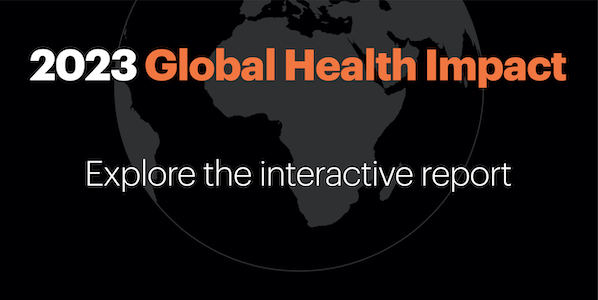
Reflecting on 2023 to inform change in the New Year
Hindsight is a gift, as the saying goes, and as we close out the year, it is easy to see that 2023 was pivotal for global health. Notably, the public health emergency due to COVID-19 ended, even as new variants emerged and efforts to address the lasting impacts of the pandemic continued.
Encouragingly, as part of the post-COVID response, we saw sustained momentum and investment in strengthening global pharmaceutical supply chains to become more transparent and resilient and a sharpened focus on the critical role of health systems in preparing for the next pandemic.
Resilient manufacturing of medicines and vaccines
On-shoring, re-shoring, and expanding pharmaceutical production in new regions such as Africa and the ecosystem approaches that are needed to get us there were dominant themes in 2023. We shared our experiences working with hundreds of industry stakeholders globally as well as our data insights to inform and shape these ongoing efforts at the World Health Assembly, World Local Production Forum, the Scientific Conference on Medicines Regulation in Africa, and many other important convenings.
Watch our side session at the World Local Production Forum
Making more quality medicines in more places requires innovative thinking and approaches. That’s why we’re reducing barriers for manufacturers to adopt new advanced manufacturing technologies, such as continuous manufacturing.
While continuous manufacturing isn’t right for all products or locations and requires significant capital investments, it’s a viable option in places like the US, where reshoring is a consideration, and presents opportunities for leapfrogging in places like Africa, where new facilities are being built that have fewer sunk costs related to traditional batch manufacturing.
We’re leveraging this state-of-the-art science to continue to strengthen capacity of manufacturers in places like Nigeria, Pakistan, and South Africa to expand their capabilities in ways that support efficiency, sustainability, and competitiveness through the Promoting the Quality of Medicines Plus (PQM+) program, funded by the U.S. Agency for International Development.
Nigeria pharmaceutical company first to receive WHO prequalification in West Africa
Read more
A case for stronger regulatory systems
Sadly, we saw another public health tragedy unfold in 2023 – one that was entirely preventable. Hundreds of children died due to the circulation of poor-quality cough syrup made with substandard ingredients, namely diethylene glycol (DEG). This disaster highlighted the challenges with complex, opaque, and global pharmaceutical supply chains, where contaminated cough syrups were found across multiple countries, from Belize to Cameroon to the Maldives.
Diethylene glycol (DEG) and ethylene glycol (EG) toolkit
Read more
National medicines regulatory authorities help detect and remove poor-quality products from circulation, playing a critical role in safeguarding public health. We’re proud to partner with 22 regulators globally to strengthen their capacity to prevent poor-quality medicines from reaching patients, including attaining internationally recognized accreditation for quality control labs.
This year, our efforts resulted in successful lab accreditations in Cambodia, Laos, and Nigeria, to name a few. And, in Ghana, we helped ensure the quality control lab could test for the presence of DEG. Through the USAID-funded PQM+ program we’re working with Ghana Food and Drug Authority to attain WHO Maturity Level 4 status, a WHO ranking which signifies a regulatory system operating at an advanced level of performance and continuous improvement.
Ensuring quality medicines for patients in Southeast Asia
National quality control laboratories protect patients from poor-quality medicines, build trust, and improve public health.
Read the visual story
In 2024, continued efforts to strengthen national regulators will be critical while working to increase information sharing, recognition, and reliance mechanisms at regional and continental levels. We’ll be working with the African Medicines Regional Harmonization (AMRH) initiative, for example, to operationalize a reliance framework for vaccine lot release testing, a first framework of its kind, developed with technical support from the PQM+ program.
From hindsight to insight
2023 also marks a pivotal year for artificial intelligence (AI), with an increase in applications as well as concerns over governance, ownership, usage, and access. At USP, we’re leveraging AI and machine learning to power our Medicines Supply Map, which provides insights into supply chain vulnerabilities, including impending shortages, to help governments, industry, and other stakeholders put plans in place to avert crisis. We’re also exploring additional applications to amplify our global impact with manufacturers, regulators, and labs.
But, for AI to make an impact, particularly in low- and middle-income countries, data quality and availability are key. It’s why we’re proud to advocate for common data standards for regulatory information management systems and working to expand the use of electronic and interoperable systems for regulators and laboratories. These steps will be critical for harvesting data, generating trends and data models, and helping regulators work more efficiently.
Building on the successes and challenges of the last year, there’s much to look forward to in 2024, including sharing some of the innovations we are starting today. With continued global support for strengthening regional manufacturing and regulation of pharmaceutical products, we’re working more than ever to expand access to safe, effective and quality-assured medical products for millions of people across the globe.
2023 Global Health Impact
Explore the interactive report



